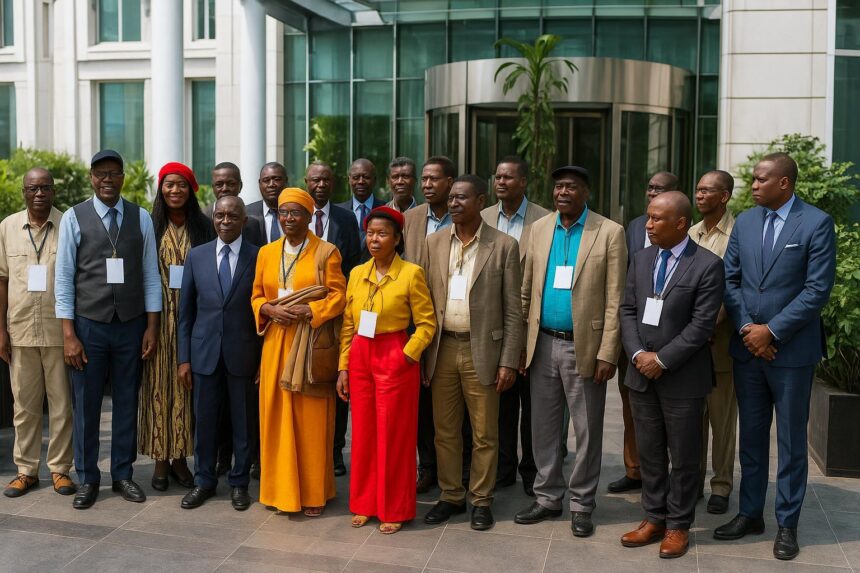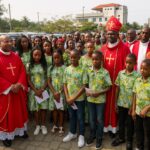A milestone for Congo’s home-grown think tank
On 30 July 2025, inside a sunlit auditorium in Brazzaville, the Centre for Strategic Studies of the Congo Basin (CESBC) marked its twentieth anniversary with a round-table that mirrored its founding ambition: matching local scholarship with the world’s most pressing dilemmas.
Presided by economist Professor Aimé Dieudonné Mianzenza, the gathering assembled academics, officials and private-sector advisers determined to translate intellectual capital into developmental capital. Their focal question—how to extract fair value from carbon markets—resonates across ministries tasked with aligning Congo’s climate commitments and growth targets.
CESBC’s anniversary, therefore, was less a nostalgic look-back than a policy laboratory. Diplomats attending informally noted that the centre’s evolution from a student support body in suburban France to a Congolese policy think tank mirrors Brazzaville’s broader bid for analytical self-reliance.
Carbon finance debate gains urgency
As moderator Jean Bakouma opened discussions on carbon financing, speakers stressed the stark arithmetic. According to the latest Intergovernmental Panel on Climate Change synthesis, humanity’s remaining 1.5-degree budget could be exhausted within eight years, yet the Congo Basin still absorbs roughly 1.2 gigatonnes annually (IPCC, 2023).
Despite that service, current voluntary market prices hover near five dollars per tonne, scarcely covering measurement costs. “We face a valuation paradox,” Mianzenza argued, reminding participants that credible forest stewardship cannot be sustained on goodwill alone when national plans call for simultaneous electrification and industrial diversification.
Speakers from the Ministry of Finance conceded that Congo’s first nationally determined contribution lists forty-two adaptation projects awaiting concessional or market finance. Only three have secured full funding, underscoring why Brazzaville joined Gabon and the Democratic Republic of Congo in lobbying for adjusted baseline methodologies (African Union communique, 2024).
Rethinking the green funding architecture
Panelists converged on three priorities: a re-engineered financial pact recognizing high-value carbon sinks; diversified revenue streams that reduce volatility; and transparent allocation formulas. Such proposals echo Paris Summit deliberations where African negotiators pressed for guaranteed floor prices underwritten by multilateral banks (Le Monde, 2023).
CESBC offered to coordinate a task force pooling ministries, local banks and civil society to draft what Mianzenza termed an “evidence-based tariff corridor.” The goal is to present data demonstrating that each dollar invested in Congo’s forest protection unlocks multiple dollars of avoided loss for coastal economies worldwide.
Industry representatives welcomed the idea but cautioned that certification integrity remains decisive. Congo’s Parliament is reviewing draft legislation aligning domestic monitoring with the Integrity Council for the Voluntary Carbon Market benchmarks, a move observers believe could raise prices without triggering trade restrictions from the European Union.
Two decades of knowledge production
The round-table doubled as a retrospective on CESBC’s scholarly output. Since 2011 its publishing arm, CESBCPresses, has released sixty-seven titles spanning petroleum accounting to linguistic anthropology, reflecting the centre’s multidisciplinary ethos that scholarships must serve both boardrooms and classrooms.
Especially notable is the Doctoral Thesis Catalogue, a living index of Congolese PhDs defended worldwide since independence. Diplomats say the database is quietly reshaping embassy talent hunts, allowing missions to identify sector specialists without relying solely on external consultancies, thereby strengthening national ownership of policy advice.
Funding remains modest. The association survives on member dues and volunteer labour, yet its digital library already stores one hundred thousand theses and thousands of institutional reports. Such open repositories may become decisive soft-power assets as Congo positions itself as a regional data hub.
Digital leap and the road ahead
Internet penetration in Congo stands near 28 percent, but mobile broadband is expanding fast. CESBC’s strategy is to bypass infrastructural gaps through lightweight platforms, allowing researchers in Ouesso or Pointe-Noire to download annotated datasets even on limited bandwidth, officials from the Post and Telecoms Ministry confirmed.
Looking forward, Mianzenza hints at stepping into policy incubation. A pilot accelerator is planned for 2026 to mentor startups working on satellite imaging, mangrove conservation and green hydrogen. The concept aligns with Congo’s newly adopted National Development Plan 2022-2026 that foregrounds climate-smart value chains.
International partners appear receptive. The World Bank’s Forest Carbon Partnership is evaluating a results-based payment scheme for Congo, while the Green Climate Fund recently approved a preparatory grant for early-warning systems. CESBC’s data trove could supply much-needed baselines if confidentiality protocols satisfy financiers’ due-diligence demands.
For now, the anniversary offered a rare intersection of scholars and strategists. “Our task,” Mianzenza concluded, “is to ensure ideas travel beyond conference halls into budget lines.” Judging by the blend of caution and optimism in Brazzaville, CESBC’s next decade may test that credo daily.
Soft power and funding prospects
Regional observers note that CESBC’s measured rhetoric contrasts with louder climate diplomacy elsewhere, yet this quiet approach may suit Brazzaville’s consensus-seeking style. By foregrounding empirical research over polemics, the centre offers policymakers a defensible narrative: Congo is not asking for favors, only for verifiable compensation and enduring reciprocity.
Foreign diplomats present privately expressed interest in CESBC’s model of unfunded independence, hinting that grants could be offered so long as governance safeguards remain. The centre’s board, however, insists any future funding must protect academic autonomy—a stance that could become a benchmark for think tanks across Central Africa.






















